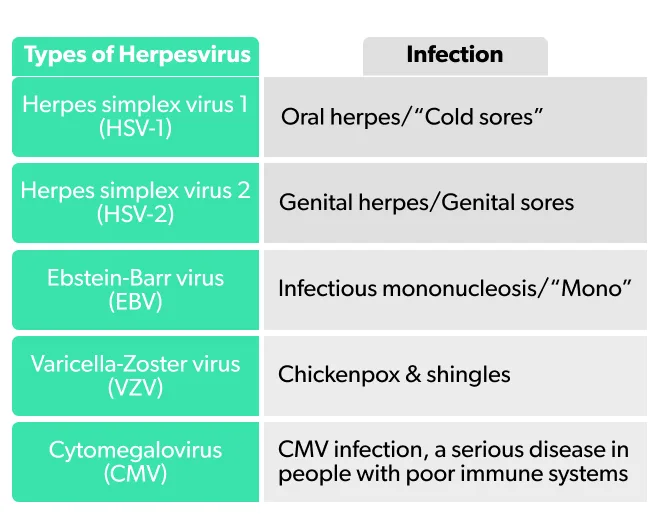Here's what we'll cover
Here's what we'll cover
Here's what we'll cover
Herpes is more than just a disease; it is actually a family of viruses, referred to as the human herpesviruses (HHV). This family includes the following common viral diseases:

This group of viruses is classified in the same family partly because of a shared characteristic: All of the herpesviruses can either cause an active infection or go into a latent (inactive) state. It is this latent state that makes them so difficult to cure.
Herpesviruses can hide out in your body and not cause any symptoms or problems for weeks, months, or even years—in fact, most people do not even realize that they have an infection. Over 87% of people in the U.S. with a genital herpes infection are never diagnosed because they do not know they have the infection (CDC, 2017). During the latent state, the herpesviruses can make infected cells "lie" to your immune system so that the body thinks that they are healthy cells. They accomplish this by inserting their own viral DNA into a normal cell's DNA. Herpesviruses can then tell the cell to make more herpesviruses—but since everything is going on inside the cell, it is protected, and the immune system doesn't know that anything is wrong. Unfortunately, even though they are not causing any symptoms, these viruses can still be contagious in the latent state.
What is gene editing, and can it help cure herpes?
CRISPR/Cas9 system is a method of gene editing that has been studied for many years in animal models. Bacteria use this system to protect themselves against viruses (Chen, 2018). When a virus infects a bacterium, it inserts its DNA into the bacterium's DNA—however, the bacterium can fight back. It uses the CRISPR/Cas9 system to identify and remove the viral DNA from its own genetic code, effectively curing itself of the virus (Chen, 2018). Scientists are studying the potential applications of the CRISPR/Cas9 system to treat human infections, like the herpesviruses. The CRISPR/Cas9 system has been studied in animal models, but new developments in human cell research show that this genome editing technology has the potential to cure herpes. Scientists have been able to use this system to decrease the number of new viruses made by human cells infected with herpesviruses. In some cases, they have eliminated the virus from infected cells (Chen, 2018). Removing the viral DNA from an infected cell's DNA essentially cures the human cell of the herpesvirus infection. Many more studies and clinical trials are needed, but gene therapy using the CRISPR/Cas9 system shows great potential in the treatment of latent viral infections like herpes.
Current treatments for herpes
While there are treatments for herpes, there is no cure. Once infected, you will have the virus for the rest of your life. The currently available FDA-approved treatments are acyclovir, famciclovir, and valacyclovir (brand name Valtrex). You usually take these medications at the first sign of active infection to shorten the outbreak. Some people need to take them on an ongoing basis to prevent outbreaks (this is called suppressive therapy). The developments using the CRISPR/Cas9 gene-editing technology are exciting because they represent a potential therapy that could provide a more definitive treatment option.
Valacyclovir Important Safety Information: Read more about serious warnings and safety info.
DISCLAIMER
If you have any medical questions or concerns, please talk to your healthcare provider. The articles on Health Guide are underpinned by peer-reviewed research and information drawn from medical societies and governmental agencies. However, they are not a substitute for professional medical advice, diagnosis, or treatment.
References
Centers for Disease Control and Prevention (CDC): STD Facts - Genital Herpes (Detailed version). (31 January, 2017). Retrieved Feb. 14, 2020 from https://www.cdc.gov/std/herpes/stdfact-herpes-detailed.htm
Chen, Y., Sheng, J., Trang, P., & Liu, F. (2018). Potential Application of the CRISPR/Cas9 System against Herpesvirus Infections. Viruses , 10 (6), 291. doi: 10.3390/v10060291. Retrieved from https://www.ncbi.nlm.nih.gov/pubmed/29844277
World Health Organization (WHO). (2017, January 31). Herpes simplex virus. Retrieved from https://www.who.int/en/news-room/fact-sheets/detail/herpes-simplex-virus










